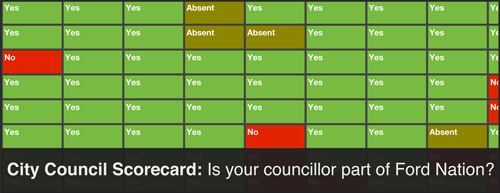The Toronto Sun’s Don Peat asks Rob Ford if he’ll be marching in the Pride parade this year, and the Mayor responds with a hearty….
“I have no idea what events I’ll be in and what events I’m not going to be in,†Ford said. “I can comment when we are closer to that date…I can’t commit to it now, I don’t know what my schedule is like.â€
via Ford won’t commit to marching in Pride parade | Toronto & GTA | News | Toronto Sun.
That’s weird, because the version of the Mayor’s schedule released last week revealed that he had a ton of free time.
Related: Since 2006, the Mayor of Toronto has officially proclaimed every May 17 as “Day Against Homophobia in Toronto.” Last year, it became “Day Against Homophobia and Transphobia in Toronto.”
The language used in these proclamations is essentially the same every year, with a little bit added about the year’s theme. This sentence appeared in every proclamation from 2006 to 2010:
Toronto has taken a leadership role in the fight for the elimination of all forms of discrimination and is committed to equal treatment of all people and their right to live in conditions of dignity, respect and peace.
This year, it appears again, but slightly modified:
Toronto is an active participant in the fight for the elimination of all forms of discrimination and is committed to equal treatment of all people and their right to live in conditions of dignity, respect and peace.
From a ‘leadership role’ to an ‘active participant.’ Weird, right?
P.S. Don’t read too much into this. I have no idea who writes these proclamations. They could come from outside agencies — perhaps, in this case, Foundation Émergence — and I doubt anyone at City Hall gives them a lot of thought. I just thought it interesting that someone, at some point, decided to alter the text this year.
